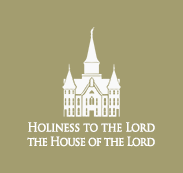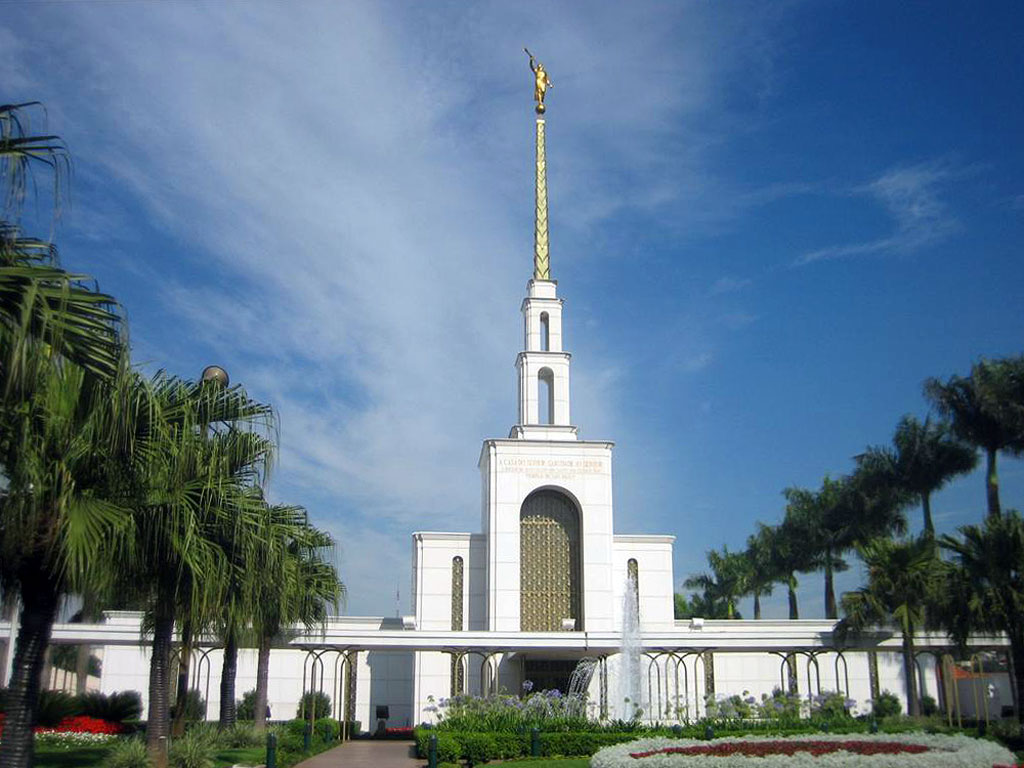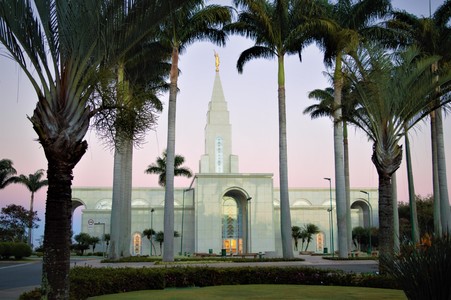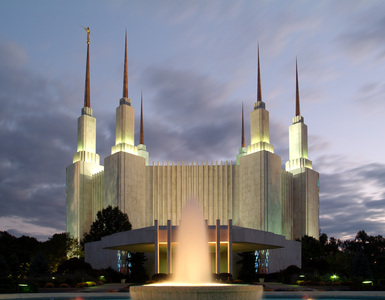Address
Av. Prof. Francisco Morato, 2390Caxingui
05512-300 São Paulo–SP
Brazil
Telephone: (+55) 11-3723-7600
Services
NO visitors' center open to the publicNO arrival center available
NO patron housing available
Distribution center on site (Store Locator)
Announcement:
1 March 1975Groundbreaking and Site Dedication:
20 March 1976 by James E. FaustPublic Open House:
September 1978Dedication:
30 October–2 November 1978 by Spencer W. KimballPublic Open House:
17 January–14 February 2004Rededication:
22 February 2004 by Gordon B. HinckleySite:
1.85 acres | 0.7 hectaresExterior Finish:
Reinforced concrete faced with cast stone composed of quartz and marble aggregates set in special white-base cementArchitectural Features:
Single attached end spire with an angel Moroni statueOrdinance Rooms:
Two instruction rooms, four sealing rooms, and one baptistryTotal Floor Area:
59,246 square feet | 5,504 square metersHeight:
101 feet | 30.8 metersElevation:
2,416 feet | 736 metersTemple Locale
Standing in one of the largest cities in the world, the São Paulo Brazil Temple occupies a beautifully landscaped tract of land on the western side of the city near a major shopping mall and Metro station, providing patrons a public transportation option to the temple. Situated on the triangular lot next to the temple are a visitors' center, accommodation center, stake center, and offices for the Brazil Area. The grounds feature a decorative water fountain and colorful flowerbeds.
Temple History
The São Paulo Brazil Temple was the first temple built in South America (and in Brazil).
The São Paulo Brazil Temple was originally named the São Paulo Temple.
Latin American members made numerous sacrifices of time, money, and material treasures to raise money for the São Paulo Brazil Temple.
At the time the São Paulo Brazil Temple was completed, there were only 15 stakes and about 54,000 members in the entire country. Following the dedication, an incredible 41 additional stakes were organized over the next 12 years, putting national membership at more than 300,000.
Before the São Paulo Brazil Temple was constructed, the closest temple to the Brazilian Saints was the Washington D.C. Temple.
The year after the São Paulo Brazil Temple was dedicated, the Church organized South America's first missionary training center in São Paulo.
For a time, the São Paulo Brazil Temple offered overnight endowment sessions from Friday through Saturday to accommodate the many members who came on the weekend.
On August 20, 2003, a gold-leafed statue of the angel Moroni was added to the São Paulo Brazil Temple, 25 years after its dedication during an extensive renovation and expansion project.
During the open house that preceded rededication of the São Paulo Brazil Temple, 99,000 visitors toured the refurbished interior.
When the São Paulo Brazil Temple was rededicated in 2004, Church membership in Brazil had grown to over 867,000.
On January 20, 2019, the first temple visitors' center in South America opened on the São Paulo Brazil Temple grounds. The former patron housing facility was renovated and repurposed as a visitors' center, accommodation center, and office building for the Brazil Area.
Temple Background
Elder L. Tom Perry called the wonder and thankful tears that followed the announcement of the São Paulo Brazil Temple "the greatest audience reaction I have ever seen." Even before a song was sung or a prayer was offered, President Spencer W. Kimball stood before the congregation gathered for the 1975 São Paulo Brazil Area Conference and said, "I have an important announcement." Hush fell over the crowd. "A temple will be built in Brazil," he continued as a rendition of the edifice was unveiled to a chorus of gasps. "It will be built [here] in São Paulo."1
Saints throughout Latin America were overjoyed by the announcement. At the time, members were expected to raise one-third of the cost of a new temple. With so many having so little, members made extraordinary sacrifices to raise money. One memorable donation was a gold dental bridge presented by an Argentine man to a pair of missionaries. They declined the gift at first, saying they couldn't take the man's teeth, but he responded, "You can't deny me the blessings I will receive by giving this to the Lord for his temple." Elder James E. Faust, who was serving as the South America area supervisor for the Church, heard the story and paid a generous sum of money for the gold. From that day on, he kept the dental bridge as a reminder of the Saints' countless sacrifices.2
Another poignant example is the service of Helvécio Martins, a respected black businessman from Rio de Janeiro who was appointed to coordinate public relations for the temple. Though Church policy at the time did not permit members of African descent to hold the priesthood or to enter the temple, Brother Martins and his wife, Rudá, worked tirelessly to advance the construction of a building they knew they may never enter. Just months before the dedication, however, the landmark revelation was received ending the restriction on blacks. President Kimball was moved to see the Martins at the dedication: "I don't know when I have ever been as touched as I was to see that man and his wife in the congregation when we were dedicating the São Paulo Temple, and to see them wipe their eyes all through the session. They were so thrilled to be permitted to have the blessings." On March 31, 1990, Helvécio Martins was sustained as the Church's first black General Authority.3
Visitors to the public open house of the temple were treated with a theatrical production entitled "The Gate," written by Ana Glucia Ceciliato. In the weeks preceding the open house, some sixty Church children, youth, and adults gathered for rehearsals in São Paulo from various cities in the region. Over 20,000 people enjoyed the talents and testimonies of these Saints, making it one of the most effective missionary tools.4
Following the dedication of the Campinas Brazil Temple, located about 60 miles northwest of São Paulo, the São Paulo temple closed in August 2002 for a significant renovation and expansion project. The most notable addition was a statue of the angel Moroni installed atop the temple's previously statueless single spire. The basement was finished into additional space, and the mechanical systems were upgraded. The original furniture—made of exceptional quality in the factory of the first stake president of Brazil—was easily restored to superb condition.5
During the open house preceding the rededication of the temple, 99,000 people toured the shiny new interior. Visitors were impressed with a feeling of peace, resulting in 6,000 requests for missionary visits and several stories of conversion. Distinguished guests included São Paulo State Governor, Geraldo Alckmin and former Brazil President Fernando Collor de Mello. "The temple is magnificent," Mr. Collor de Mello said. "Congratulations on your faith in Brazil and on the strength and faith of your people."6
- Richard O. Cowan, "The Pace Quickens," Temples to Dot the Earth (Springville, Utah: Cedar Fort, Incorporated, 1997): 181.
- James P. Bell and James E. Faust, "Back to Brazil," In the Strength of the Lord: The Life and Teachings of James E. Faust (Salt Lake City, Utah: Deseret Book Company, 1999) 109–110.
- Milton V. Backman and Richard O. Cowan, "Revelation Continues," Joseph Smith and the Doctrine and Covenants (Salt Lake City, Utah: Deseret Book Company, 1992) 148–150.
- Daniel H. Ludlow, "South America, The Church in," Encyclopedia of Mormonism (New York: Macmillan Publishing Company, 1992) 1396.
- Fernando Assis, "Sao Paulo temple ready for re-dedication," Church News 31 Jan. 2004: 3.
- "99,000 visit temple," Church News 28 Feb. 2004: 5.



